-
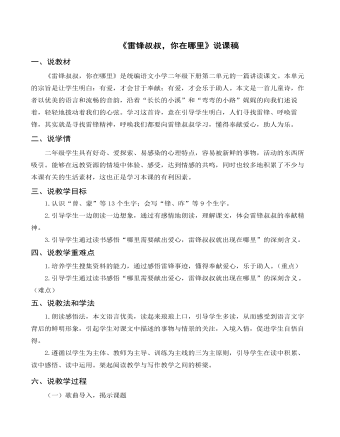
(说课稿)《雷锋叔叔,你在哪里》部编人教版二年级上册语文
三、说教学目标1.认识“曾、蒙”等13个生字;会写“锋、昨”等9个生字。2.引导学生一边朗读一边想象,通过有感情地朗读,理解课文,体会雷锋叔叔的奉献精神。3.引导学生通过读书感悟“哪里需要献出爱心,雷锋叔叔就出现在哪里”的深刻含义。四、说教学重难点 1.培养学生搜集资料的能力,通过感悟雷锋事迹,懂得奉献爱心,乐于助人。(重点)2.引导学生通过读书感悟“哪里需要献出爱心,雷锋叔叔就出现在哪里”的深刻含义。(难点)五、说教法和学法1.朗读感悟法,本文语言优美,读起来琅琅上口,引导学生多读,从而感受到语言文字背后的鲜明形象,引起学生对课文中描述的事物与情景的关注,入境入情,促进学生自悟自得。2.遵循以学生为主体、教师为主导、训练为主线的三为主原则,引导学生在读中积累、读中感悟、读中运用。架起阅读教学与写作教学之间的桥梁。
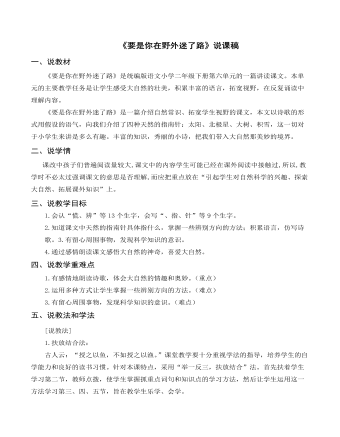
(说课稿)《要是你在野外迷了路》部编人教版二年级上册语文
六、说教学过程(一)创设情境,激趣导入 一堂课的开始,为了使学生尽快地进入学习状态,在情境创设中,应该做到新颖,要让学生感受到一种新的情境,从而产生好奇心,达到集中注意力的目的。教学开始,我首先创设情境,提出了两个问题:1.如果你在大街上迷路了,你会怎么做?2.如果你在野外迷了路,你又会怎么做?【设计意图】这两个问题的提出让学生区分在不同的地点迷了路要用不同的方法。然后我顺势导入课文:我们来学习课文,看看如果在野外迷了路,有什么办法分辨方向。(二)初读课文,整体感知 1.让学生自由读课文,要求把字音读准,把句子读通顺。然后老师范读一遍,让学生注意听老师是怎么读的,如字音、节奏等。2.再次自由读课文,按着老师的方法读诗歌,然后把本课的生字读一遍。【设计意图】这样,学生对于课文的生字和大概内容就有了一个整体印象,培养了他们的自学能力。

(说课稿)识字《 “贝”的故事》部编人教版二年级上册语文
一、说教材《“贝”的故事》是统编语文小学二年级下册第三组识字单元第三篇课文。这篇课文由贝类引入,讲述了古人对贝的喜爱,讲解了一些由“贝”衍生出的汉字,如:赚、赔、购、贫、货等,让学生了解汉字的起源:刚开始是用具体的事物帮助记忆、交流思想,然后依靠集体的智慧,经过时间的锤炼,就形成了汉字。二、说学情二年级的学生对汉字的起源不了解,但这一课形象生动地讲解了与“贝”相关的汉字,学生易于接受。因此,教师可安排学生在课前搜集汉字知识,在课外拓展汉字知识,这样,学生对于汉字的起源及相关知识会有一个系统化的了解。三、说教学目标1.认识“甲、骨”等16个生字;会写“贝、壳”等9个生字。2.默读课文,了解贝字的起源,贝的作用以及字形字义。3.进一步了解汉字的意思,与偏旁有关的特点。4.通过学习,感受汉语言文字和中华文化的博大精深,源远流长。
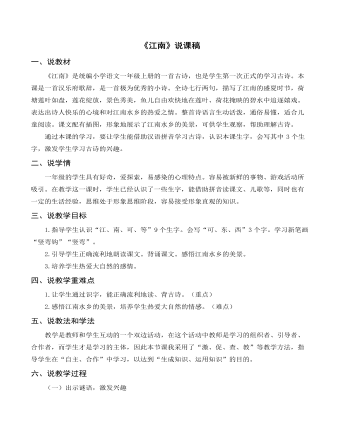
部编人教版一年级上册《江南》说课稿
三、说教学目标1.指导学生认识“江、南、可、等”9个生字。会写“可、东、西”3个字。学习新笔画“竖弯钩”“竖弯”。? 2.引导学生正确流利地朗读课文。背诵课文。感悟江南水乡的美景。? 3.培养学生热爱大自然的感情。四、说教学重难点1.让学生通过识字,能正确流利地读、背古诗。(重点)?2.感悟江南水乡的美景,培养学生热爱大自然的情感。(难点)五、说教法和学法教学是教师和学生互动的一个双边活动,在这个活动中教师是学习的组织者、引导者、合作者,而学生才是学习的主体,因此本节课我采用了“激、促、查、教”等教学方法,指导学生在“自主、合作”中学习,以达到“生成知识、运用知识”的目的。
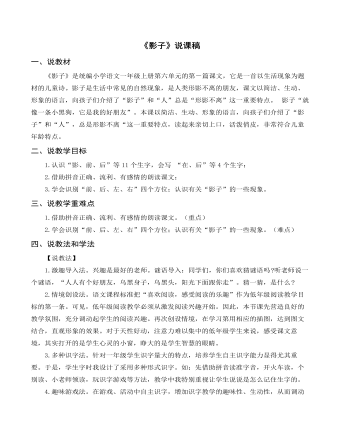
部编人教版一年级上册《影子》说课稿
【说学法】1.合作学习法。以学生为本、小组合作、生生互助的形式来学习,培养学生在合作中取长补短,互帮互助的合作精神。 同组一起把生字读两遍。然后互相检查看看是否读准字音。并说说自已是怎样记住哪个字的,让学生感受合作学习的快乐。 2.朗读比赛法。为了达到正确、流利地朗读课文的目的。让学生利用多种形式读。如:同桌对读,个别读,小组读等方法,贯穿始终,读中悟,悟中读,收到以读代讲以读悟情的效果。 3.自主评价法。通过让学生自主评价,培养学生倾听,欣赏以及表达能力。从而使低年级学生从小养成学习语文的良好习惯。 五、说教学过程(一)谜语导入,揭示课题1.出示谜语,引出“影子”。? 你有我有他也有,黑身黑腿黑黑头。灯前月下跟你走,就是从来不开口。? (设计意图:猜谜语是小学生喜欢的活动。这个谜语不仅引出了课题,而且呈现了本课要学习的生字,可以给学生一个初步的认识。)
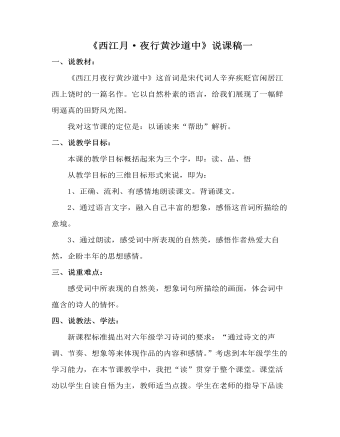
部编人教版六年级上册《古诗词三首:西江月·夜行黄沙道中》说课稿
一、说教材:《西江月夜行黄沙道中》这首词是宋代词人辛弃疾贬官闲居江西上饶时的一篇名作。它以自然朴素的语言,给我们展现了一幅鲜明逼真的田野风光图。我对这节课的定位是:以诵读来“帮助”解析。二、说教学目标:本课的教学目标概括起来为三个字,即:读、品、悟从教学目标的三维目标形式来说,即为:1、正确、流利、有感情地朗读课文。背诵课文。2、通过语言文字,融入自己丰富的想象,感悟这首词所描绘的意境。3、通过朗读,感受词中所表现的自然美,感悟作者热爱大自然,企盼丰年的思想感情。三、说重难点:感受词中所表现的自然美,想象词句所描绘的画面,体会词中蕴含的诗人的情怀。四、说教法、学法:新课程标准提出对六年级学习诗词的要求:“通过诗文的声调、节奏、想象等来体现作品的内容和感情。”考虑到本年级学生的学习能力,在本节课教学中,我把“读”贯穿于整个课堂。
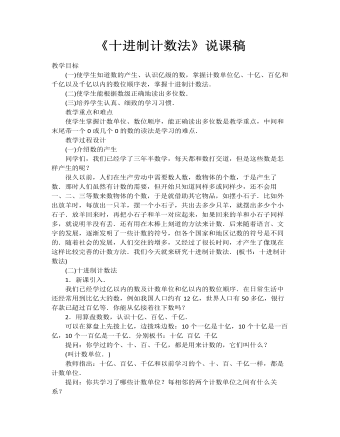
小学数学人教版四年级上册《十进制计数法》说课稿
(二)十进制计数法1.新课引入.我们已经学过亿以内的数及计数单位和亿以内的数位顺序.在日常生活中还经常用到比亿大的数,例如我国人口约有12亿,世界人口有50多亿,银行存款已超过百亿等.你能从亿接着往下数吗?2.用算盘数数,认识十亿、百亿、千亿.可以在算盘上先拨上亿,边拨珠边数:10个一亿是十亿,10个十亿是一百亿,10个一百亿是一千亿.分别板书:十亿 百亿 千亿提问:你学过的个、十、百、千亿,都是用来计数的,它们叫什么?(叫计数单位.)教师指出:十亿、百亿、千亿和以前学习的个、十、百、千亿一样,都是计数单位.
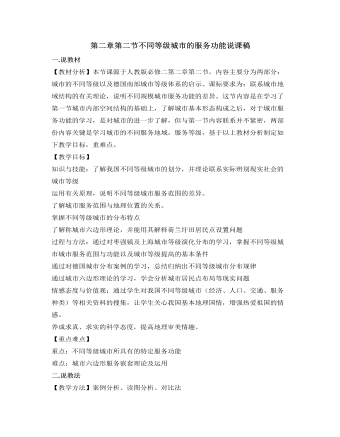
人教版高中地理必修2第二章第二节不同等级城市的服务功能说课稿
【教学目标】知识与技能:了解我国不同等级城市的划分,并理论联系实际辨别现实社会的城市等级运用有关原理,说明不同等级城市服务范围的差异。了解城市服务范围与地理位置的关系。掌握不同等级城市的分布特点了解称城市六边形理论,并能用其解释荷兰圩田居民点设置问题过程与方法:通过对枣强镇及上海城市等级演化分布的学习,掌握不同等级城市城市服务范围与功能以及城市等级提高的基本条件通过对德国城市分布案例的学习,总结归纳出不同等级城市分布规律通过城市六边形理论的学习,学会分析城市居民点布局等现实问题情感态度与价值观:通过学生对我国不同等级城市(经济、人口、交通、服务种类)等相关资料的搜集,让学生关心我国基本地理国情,增强热爱祖国的情感。养成求真、求实的科学态度,提高地理审美情趣。

新人教版高中英语必修2Unit 4 History and Traditions-Discovering Useful Structure教案二
This teaching period mainly deals with grammar: The past participle is used as attributive and objective complement.1. Guide students to review the basic usages of the past participle used as attributive and objective complement.2. Lead students to learn to use some special cases concerning the past participle used as attributive and objective complement flexibly.3. Strengthen students’ great interest in grammar learning.1. Help students to appreciate the function of the past participle used as attributive and objective complement.2. Instruct students to write essays using the past participle used as attributive and objective complement.Step1:温故而知新。Analyze the underlined phrases and then sum up the common usages of the past participles.1.(教材P41)They had castles built(build) all around England, and made changes to the legal system.2.(教材P42)They use the same flag, known(know) as the Union Jack,...3.(教材P42)Judy and I had our car parked(park) in an underground car park near Trafalgar Square, where we could get our car battery charged(charge).Common points: f the past participle used as attributive and objective complement.Step 2:过去分词作定语时的意义1.及物动词的过去分词作定语,在语态上表示被动;在时间上,常表示动作已经发生或完成,有时也不表示时间性。Our teacher watched us doing the experiment and gave us a satisfied smile at last.我们的老师看着我们做实验,最后给了我们一个满意的微笑。The plan put forward at the meeting will be carried out soon.会上提出的计划将很快被执行。2.不及物动词的过去分词作定语,它不表示被动意义,只强调动作完成。Many little kids like gathering fallen leaves in the yard.

新人教版高中英语必修2Unit 1 Cultural Heritage-Discovering Useful Structure教案二
This theme of the part is “ Describe people or things in greater detail”. Students have learned the grammar(restrictive relative clauses) in Book 1, and further review and consolidate its structure “prep+relative pronouns(which/whom)” and the relative adverbs(when, where and why), besides students should understand its form, meaning and functions. In this section, students should be able to express the grammar correctly in daily communication and in the writing. 1. Review the basic usages of relative pronouns and adverbs of attributive clauses . 2. Learn to use some special cases about restrictive relative clauses.3. Learn to write sentences with restrictive relative clauses flexibly according to the context.1. Review the basic usages of relative pronouns and adverbs of attributive clauses .2. Learn to use some special cases about restrictive relative clauses.3. Learn tow rite sentences with restrictive relative clauses flexibly according to the context.Step 1. Observe the following sentences, and mark the relative pronouns and the adverbs. 1. After listening to the scientists who had studied the problems, and citizens who lived near the dam, the government turned to the United Nations for help.2. Temples and other cultural sites were taken down piece by piece, and then moved and put back together again in a place where they were safe from the water.Step 2 PracticePlease complete these sentences with relative pronouns and relative adverbs and answer the following questions.Questions: 1. What is the head noun ?2. What relative words should be used ?3. What elements do they act in these sentences ?

新人教版高中英语必修2Unit 1 Cultural Heritage-Reading and Thinking教案二
1. This section focuses on "Understanding how a problem was solved”, which is aimed to guide students to analyze and discuss the challenges and problems faced by cultural heritage protection during the construction of Aswan Dam, as well as the solutions. On the basis of understanding, students should pay attention to the key role of international cooperation in solving problems, and attach importance to the balance and coordination between cultural heritage protection and social and economic development. Students are encouraged to face challenges actively, be good at cooperation, and make continuous efforts to find reasonable ways and means to solve problems.2. Enable students to understand the main information and text structure of the reading text;3. Motivate students to use the reading strategy "make a timeline" according to the appropriate text genre;4. Enable students to understand how a problem was solved;5. Enable students to understand the value of protecting cultural heritage by teamwork and global community;1. Guide students to pay attention to reading strategies, such as prediction, self-questioning and scanning.2. Help students sort out the topic language about protecting cultural relics and understand the narrative characteristics of "time-event" in illustrative style3. Lead students to understand the value of protecting cultural heritage by teamwork and global community;

新人教版高中英语必修2Unit 2 Wildlife Protection-Discovering Useful Structure教案二
2.表示现阶段正在进行的被动动作(该动作在说话的瞬间未必正在进行)。Many interesting experiments are being carried out these days.(说话时,并不一定正在进行)3.表示一种经常性的被动行为,常和always,constantly 等表示频度的副词连用,这种用法常常带有赞扬或厌恶的感情色彩。He is always being praised by the leader.4.表示按计划或安排主语将要承受谓语动词所表示的动作(仅限于少数及物动词)。A party is being held tonight.Step 4 Special cases1.像take care of, look after, talk about, think of等动词与介词构成的短语用于现在进行时的被动语态时, 其中的介词不可省略。The ways to stop illegally hunting are being talked about. 2.可与部分情态动词连用,表示对正在发生的事情的推测。She may be being punished by her mother.3.有时可表示按计划或安排将要进行的一个被动动作。A celebration is being held this weekend for his success.4.某些表示“状态、心理活动、存在”等的动词,如have,want,need,love,一般不用现在进行时的被动语态,而常用一般现在时的被动语态。With the population increasing,more land is needed.5.“be+under/in+n.”可表示现在进行时的被动意义。My computer is under repair.=My computer is being repaired.

新人教版高中英语必修2Unit 3 The Internet-Discovering Useful Structure教案二
This teaching period mainly deals with grammar “The Present Perfect Passive Voice.” To begin with, teachers should lead students to revise what they have learned about the Present Perfect Passive Voice. And then, teachers move on to stress more special cases concerning this grammar。This period carries considerable significance to the cultivation of students’ writing competence and lays a solid foundation for the basic appreciation of language beauty. The teacher is expected to enable students to master this period thoroughly and consolidate the knowledge by doing some exercises. 1. Guide students to review the basic usages of the Present Perfect Passive Voice2. Lead students to learn to use some special cases concerning the Present Perfect Passive Voice flexibly.2. Enable students to use the basic phrases structures flexibly.3. Strengthen students’ great interest in grammar learning.1. Help students to appreciate the function of the Present Perfect Passive Voice in a sentence2. Instruct students to write essays using the proper the Present Perfect Passive Voice.观察下列句子特点,总结共同点。1.(教材P28)Much has been written about the wonders of the World Wide Web.2.(教材P28)But the Internet has done much more for people than simply make life more convenient.3.(教材P28)Many people have been helped by the club.4.(教材P28)She no longer feels lonely, and her company has become quite successful.5.(教材P32)Today I thought I’d blog about a question that has been asked many times—how do you stay safe online and avoid bad experiences on the Internet?

新人教版高中英语必修2Unit 3 The Internet-Reading and Thinking教案二
Q5:What's Jan's next goal?Her next goal is to start a charity website to raise money for children in poor countries.Q6:What can we learn from her experiences?We learn that when we go through tough times, we can find help and support from other people online. We learn that we can feel less lonelyStep 5: While reading---rethinkingQ1: What is Jan’s attitude to the Internet ?Thankful/Grateful, because it has changed her and her life.Q2: What writing skills is used in the article ?Examples(Jan’s example, the 59-year-old man’s and the 61-year-old woman’s example)Q3: Can you get the main idea of the article ?The Internet has changed Jan’s life/Jan’s life has been changed by the Internet.Step 6 Post reading---Retell the storyMuch has been written about the wonders of the World Wide Web. There are countless articles (1)telling(tell) us how the Internet has made our lives more convenient. But the Internet has done a lot (2)more(much) for people than simply make life more convenient. People’s lives (3) have been changed(change) by online communities and social networks so far. Take Jan for example, who developed a serious illness that made her (4)stuck(stick) at home with only her computer to keep (5)her(she) company. She joined an online group (6)where she could share problems, support and advice with others. She considered the ability to remove the distance between people as one of the greatest (7)benefits(benefit). She was so inspired (8)that she started an IT club in which many people have been helped. She has started to learn more about how to use the Internet to make society better. Her next goal is to start a charity website to raise money (9)for children in poor countries. Jan’s life has been (10)greatly(great) improved by the Internet.

新人教版高中英语必修2Unit 4 History and Traditions-Reading and Thinking教案二
Step 5 While reading---Task 3Read the text again and answer the following questions.Q1: How many countries does the UK consist of ?4 Q2: What are the four countries of the United Kingdom?England, Wales, Scotland and Northern Ireland Q3: Which two were the first to be joined together ?England and WalesQ4: What are the two chief advantages of studying the history of a country ?The first one is to help you understand more about the country and its traditions.The second one is to make visiting it more enjoyable.Q5: What’s the author’s attitude towards studying the history ?Supportive/positiveStep 6 Post reading---Retell the textThe United Kingdom, Great Britain, Britain, England—many people are confused by (1)_____ these different names mean. In the 16th century, the nearby country of Wales (2) __________(join) to the Kingdom of England. In the 19 th century, the Kingdom of Ireland was added to create the United Kingdom of Great Britain and Ireland. Finally, the southern part of Ireland (3) ______ (break) away from the UK, which resulted in the full name we have today. However, most people just use the (4)_________(shorten) name: the UK. The four countries (5)__________ belong to the United Kingdom work together in some areas. There were four sets of invaders and the last group were the Normans. They had castles (6)_________(build) all around England and made changes (7)__________ the legal system. Studying the history of the country will make your visit much more (8)_________(enjoy). The capital city London is (9)___ ancient port city that has a history (10)______(date) back to Roman times. 1. what 2.was joined 3.broke 4.shortened 5.that 6. built 7.to 8.enjoyable 9.an 10.dating Step 6 Homework

新人教版高中英语必修2Unit 4 History and Traditions-Listening&Speaking&Talking教案二
Listening and Speaking introduces the topic of “Take part in a youth project”. The listening text is an interview about "sharing views on historical sites". Through listening to a dialogue between Chinese and foreign students on the way to the Confucius Temple, students can understand their views on the Confucius Temple, Confucius, Confucius' descendants and Confucius' educational thoughts, so as to realize and think about the profound influence of Confucius and his thoughts on Chinese historical tradition. At the same time, the dialogue naturally integrates English idioms and mentions Shakespeare, the British playwright, so as to provide language materials and context for students to understand English idioms and related cultural allusions, as well as to compare Chinese and foreign cultures, which is helpful for students to understand and express the language such as history, tradition, culture and custom significant impact.Text analysis: listening text is a dialogue between a British student and a Chinese student when he goes to the Confucius Temple. When William, a British student, visited the Confucius Temple, he asked Xiao Kong, a Chinese student, for directions. Xiao Kong was just going to the Confucius Temple to meet with the members of the research group, so they went together and exchanged their views on the Confucius Temple, Confucius, Confucius' descendants and Confucius' educational thoughts. From the perspective of foreign tourists, this paper describes their thoughts on Confucius, the great son of Confucius, who had a profound impact on Chinese history and cultural tradition, and his education.Listening and Talking introduces a visit to a historic tourist destination. Tourism is a common way to understand a country's history, culture, and customs and so on. Students listen to the dialogue between Xiao Yan, a youth hostel Usher, and Paul, a backpacker, to learn about Pingyao's famous historical and cultural attractions and Paul's travel experience and experience as a foreign tourist.

新人教版高中英语必修2Unit 5 Music-Discovering Useful Structures教案二
4. When he got absorbed in his world of music, he felt as if he could “see” the beauty of the world around him, like he had in his previous life.P·P as adverbial: _________________________________________________________________.Function: _______________________________________________________________________.Step 5 Solid Complete the passage with the words in brackets in their correct forms.Well known as a successful band, the Impact members show quite a few striking qualities. They never ever give up. When _____________(question) by the media, they are not _____________(discourage) and practise even harder. They are improving themselves by attending several master training class. They are united. _____________(fill with) team spirit, they act as a whole, always aiming for glory. Step 6 Difference and similarity from -ingObserve the following examples.1. He went out, shutting the door behind him.=He went out, ________________________________________________________.2. Not knowing what to do, he went to his parents for help.=__________________________________________, he went to his parents for help.Similarity: _______________________________________________________________________________________________________________________________________________________.Difference : _______________________________________________________________________________________________________________________________________________________.Step Practice1. ________ in a hurry, this article was not so good. 因为写得匆忙, 这篇文章不是很好。2. ________ carefully, he found something he hadn’t known before. 他仔细读书时, 发现了一些从前不知道的东西。3. ________ why he did it, the monitor said it was his duty. 当被问及他为什么要这么做时, 班长说这是他的职责

新人教版高中英语必修2Unit 5 Music-Reading and Thinking教案二
1. Get basic information about Eric; read deeply to understand the history and development of the virtual choir.2. Understand what the function of the virtual choir is and how to make a virtual choir.3. Understand the meaning of some languages in the context of the text through question guidance, such as “Many people do not have close friends or contacts who have the same interest in music.” and so on.Step 1 Leading-in1. Answer the following questions.Q1:Do you know the Apps like Tik Tok and Quick Hand?Q2: Do you want to make a Tik Tok video or a Quick Hand video?2. Play a Tik Tok video Step 2: Understanding the title Q1:What does the title mean ?Q2: Is the article a narration or exposition? Why? Q3: Can you change the title ? If you can, what is the title?Step 3: Scanning the whole text and getting the basic information1. Answer the following questions.Q1:Who came up with the idea for a virtual choir?Q2: Where did Eric studied the musical composition?Q3: What is his song?2. Find the main idea of each paragraph3. Deal with some new words.Step 4: Reading carefully to get detailed informationPara 1 How to make a virtual choir1. PreparationA. tools: a virtual camera; an Internet connectionB. hero/heroin: friends or some individuals who have the same interests2. Process

新人教版高中英语必修2Unit 5 Music-Reading for Writing教案二
The Internet celebrity Gao Yifeng. Years ago, he owned 5 companies and the staffs over 1,000, but during the economy crisis, he became nothing but debt. He was so worried that his hair became white overnight. There was a time when he wanted to killed himself. But after listening to the song Start Over by Liu Huan, he decided to cheer himself up. He started a steamed bun shop and gradually became a national chain shops. Now he became successful again.Walter Haddon said, “Music is the medicine of a troubled mind.” Music contains such a pleasant and inspiring force. Music gave him courage and bravery. When he listened to the song, it made his spirit fly like a kite in the wind. Music gave him strength and brought him relief. It was the rock I leant on to become strong and to get through those hard times. I hope none of us have to go through the same kind of suffering that he did. At the same time, we all go through various periods when we feel sad or alone. During those times, music can help us in the same way that it helped him. I hope we all will somehow begin to treasure music and make it a part of our life. Thank you for your listening !5.Revise your writing each other.Does he/she explain how music has changed his/her/someone else’s life?Are some of the rhetorical devices included and used properly ?Does he/she talk about how music makes him/her/someone feel?Is the first word in each sentences capitalised?Does he/she use correct punctuation ?

新人教版高中英语必修2Unit 2 Wildlife Protection-Reading for Writing教案二
This lesson aims at making a poster about protecting wildlife after reading some posters. During reading students are guided to understand the content and try to summarize the posters with one sentence. Then students are guided to try to make a poster about protecting wildlife.1. Read the two posters and try to understand the summary sentences.2. Look at the two posters and try to understand what emotions they express.3. Try to summarize the features of posters4. Try to make a poster about wildlife.1. Look at the two posters and try to understand what emotions they express.2. Try to summarize the features of posters3. Try to make a poster about wildlife.Step 1 Lead inLook at the the posters on the textbook and ask:Which emotions do the posters communicate ?Step 2 Read the poster and answer the questions.1. What do you think of the animals in the poster on the left ?I think it is frightening and ugly.2. Why do we should protect the ugly animals ?All species--the good, the bad, and the ugly-- should be treated equally.The world needs all kinds--without variety, our planet cannot survive.3. Why are billions of trees being cut down every year ?To make paper for humans.4. What result will be lead to after the trees are cut down ?A lost of animal homes are being destroyed./The habitat of wildlife is being destroyed.Step 3 Find the feature of posters1. What does each poster use to stir up emotions ?On the left, it makes us a little frightened and it looks a little ugly, but it can activate our curiosity--What is it? And What is wrong with it?On the right, it makes us feel a little sad and want to protect them.